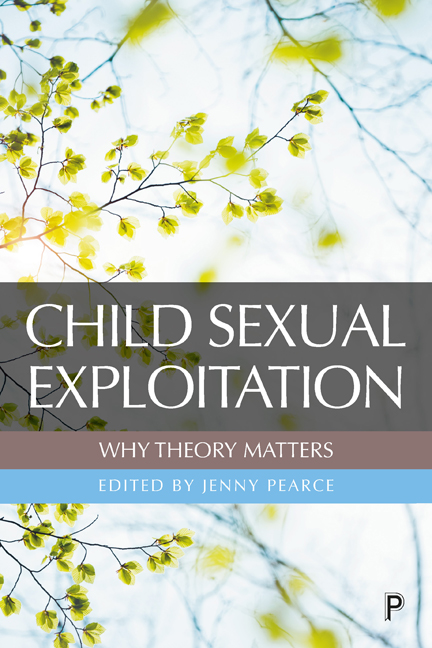Book contents
- Frontmatter
- Contents
- List of Figures and Tables
- Notes on Contributors
- Editor’s Acknowledgements
- Foreword
- 1 Bringing Theory Home: Thinking About Child Sexual Exploitation
- 2 Moving Beyond Discourses of Agency, Gain and Blame: Reconceptualising Young People’S Experiences of Sexual Exploitation
- 3 Child Sexual Exploitation, Discourse Analysis and why we Still Need to Talk About Prostitution
- 4 Contextual Safeguarding: Theorising the Contexts of Child Protection and Peer Abuse
- 5 ‘Losing Track of Morality’: Understanding Online Forces and Dynamics Conducive to Child Sexual Exploitation
- 6 Understanding Adolescent Development in the Context of Child Sexual Exploitation
- 7 Some Psychodynamic Understandings of Child Sexual Exploitation
- 8 Understanding Trauma and its Relevance to Child Sexual Exploitation
- 9 Social Support, Empathy and Ecology: A Theoretical Underpinning for Working with Young People who have Suffered Child Sexual Abuse or Exploitation
- 10 Using an Intersectional Lens to Examine the Child Sexual Exploitation of Black Adolescents
- 11 What’s Gender Got to do With It? Sexual Exploitation of Children as Patriarchal Violence
- 12 Understanding Models of Disability to Improve Responses to Children with Learning Disabilities
- 13 Some Concluding Thoughts
- Index
Foreword
Published online by Cambridge University Press: 10 March 2021
- Frontmatter
- Contents
- List of Figures and Tables
- Notes on Contributors
- Editor’s Acknowledgements
- Foreword
- 1 Bringing Theory Home: Thinking About Child Sexual Exploitation
- 2 Moving Beyond Discourses of Agency, Gain and Blame: Reconceptualising Young People’S Experiences of Sexual Exploitation
- 3 Child Sexual Exploitation, Discourse Analysis and why we Still Need to Talk About Prostitution
- 4 Contextual Safeguarding: Theorising the Contexts of Child Protection and Peer Abuse
- 5 ‘Losing Track of Morality’: Understanding Online Forces and Dynamics Conducive to Child Sexual Exploitation
- 6 Understanding Adolescent Development in the Context of Child Sexual Exploitation
- 7 Some Psychodynamic Understandings of Child Sexual Exploitation
- 8 Understanding Trauma and its Relevance to Child Sexual Exploitation
- 9 Social Support, Empathy and Ecology: A Theoretical Underpinning for Working with Young People who have Suffered Child Sexual Abuse or Exploitation
- 10 Using an Intersectional Lens to Examine the Child Sexual Exploitation of Black Adolescents
- 11 What’s Gender Got to do With It? Sexual Exploitation of Children as Patriarchal Violence
- 12 Understanding Models of Disability to Improve Responses to Children with Learning Disabilities
- 13 Some Concluding Thoughts
- Index
Summary
This book provides a unique and current overview of the role of theory in understanding and responding to child sexual exploitation (CSE). As practitioners, academics and policymakers we do not necessarily consider the important and central role that theory plays in underpinning and informing our work in the area of CSE and child sexual abuse (CSA). It is unfortunately the case that theory has become somewhat separate from practice all too often ‘remain(ing) in books and not jumping off the page into use’, theory is perhaps seen as something that academics ‘do’ that has little relevance for those working directly with children affected by CSE. This view may be exacerbated by education and training across social sciences and other relevant disciplines, that has traditionally separated theory, research and practice rather than promoting a more integrated understanding of the ways in which theory might usefully underpin and enable practice.
This book eloquently challenges the assumption that theory has no relevance in practice with young people affected by CSE, illustrating ways in which theoretical definitions, constructs and models from many different disciplines should not only inform practice, but should also cause us to continually question our own assumptions, considering the ways in which these assumptions might have an impact upon our work with and about young people. These assumptions may force us to continue working in ways that are based on the received wisdom in which our disciplines are steeped. For example, the contributors in this book challenge the use of language and terms questioning current narratives and ‘collective agreements’ regarding the meaning of CSE, criticising the way in which young people are cast as victims. This essentially denies their agency and the choices they make. The development of effective child protection systems is seen to be hampered by a focus on the role of parents in shaping children's behaviour with no consideration of peer, community and other social influences. Cyberlibertarian ideology is held to account for resulting in an internet that is under-regulated and not designed with children in mind, thus becoming a space where CSE has freedom and licence, resulting in a form of ‘ethical drift’.
- Type
- Chapter
- Information
- Child Sexual Exploitation: Why Theory Matters , pp. xiii - xivPublisher: Bristol University PressPrint publication year: 2019



